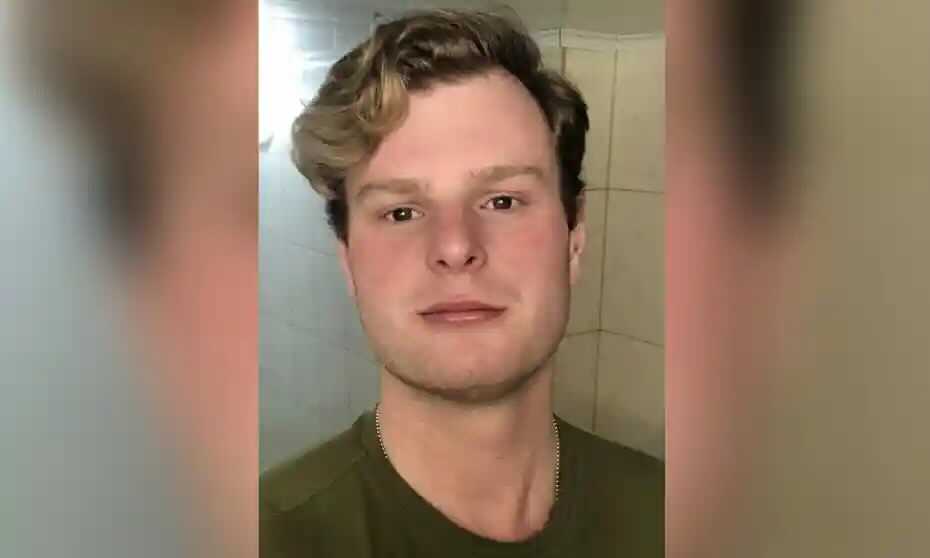On ANZAC Day, the day when Australians commemorate their military fallen, Lera talks about “Don,” the Australian ex-serviceman whom she lost in the war with Russia.
Valeria “Lera” Stepanenko, 20, is not in Sydney or Brisbane. Rather, she is in a tiny farming village in northeastern Ukraine. It was occupied by Russian forces for seven months. She is there as part of a humanitarian mission with volunteer colleagues from the Kharkiv Humanitarian Center. As the elderly villagers in their muddy boots line up for their food packages, there’s a herd of goats and a destroyed car with Putin’s “Z” symbol in the background.
JOIN US ON TELEGRAM
Follow our coverage of the war on the @Kyivpost_official.
“At night after training, Don and I would walk around Rivne and have a coffee. It was our routine. We talked about Ukrainian history and politics and, of course, the war that brought us together. Don was committed to learning everything he could,” Lera said.
She is a translator from the mid-sized city in central-western Ukraine. “Don” was Sage O’Donnell, a 24-year-old from Melbourne, who was killed by artillery shrapnel during combat operations in December 2022 in the Luhansk region of eastern Ukraine.
He is one of seven Australians and New Zealanders who have died while serving with Ukrainian forces since the beginning of the full-scale war some 14 months ago.
The couple had met when Lera was translating for him and four international colleagues who were training Ukrainian and other international military volunteers in urban search missions, tactical medicine and demining operations at a military base near Rivne in the summer of 2022.

Norway Doubles Ukraine Aid to €7B
“Every morning, even after he went to the front, Don would wake up to see the sunrise. He also made a point of watching the sun set every evening. It was his way of being completely alive,” Lera said.

24-year-old Sage O’Donnell
Don had come to Ukraine in April 2022 after seeing a picture of a bloodied woman in Bucha. According to Lera, the image reminded him of his mother, who has Ukrainian roots. She said that Don decided almost instantly to go to put his military skills to use and serve in Ukraine’s defense, as relatives of his had served in the Ukrainian Insurgent Army, which fought both the Nazis and Soviet Russians in World War II.
Before he deployed to the front in eastern Ukraine to join colleagues with the International Legion, Don had decided to stay on in Ukraine.
“He wanted a place where he could see the sunrise and sunset. We’d found a place by the lake near Rivne. There were birds there and that’s how he chose his nom de guerre “Chaika,” Lera said.
“Chaika” is seagull in Ukrainian.
Chaika also chose a name for his combat weapon, as is the custom of some soldiers. He served with “Lera,” as he’d remind the real-life one during daily calls and texts on a messaging app from the frontline position he deployed to.
“It’s not getting those little messages, the daily contact, which is what I miss the most about Don,” Lera said. She wears an Australian military jacket with O’Donnell inscribed on its chest pocket.
The day before his final deployment Don gave Lera a letter and instructions to open it if he was to die. He said it was addressed to all Ukrainians and asked Lera to share it with them.
In his final letter, Don said: “Before coming to Ukraine, I wasn’t exactly the greatest example of a man… Yet when the invasion started, I realized my calling… You taught me to love and be loved by people and god. Even in the hardest time, though many were struggling, you helped me… For someone not used to such charity and kindness, I can tell you with all honesty that you changed my life.”
Lera believes it’s part of her duty to share the letter and to talk about Don’s commitment and his service. “A person dies twice. Once physically and then when everyone forgets them. He cannot be forgotten. He gave his life for a cause and his loss cannot be in vain,” Lera said.
Lera burns with her cause. While other young women of her age plan their future around education, careers, relationships and personal dreams, Lera’s outlook is rooted in the raw reality of her homeland and its current tragedies and triumphs.
“Every time that one of ours dies, I die too. When the soldier was executed in his foxhole, I died too. When the orcs beheaded the POW, I died too. It must be ended,” Lera said.
“This is my country. I want my own children to live in a country where they don’t know what war is. I want my parents to retire in peace in their own country,” Lera said. “For that to happen, I have to fight in my own way just as Don fought his own way.”
The humanitarian team reaches the next village. There is internet coverage there. Lera is shown a video posted on ANZAC Day on Facebook by Vasyl Myroshnychenko, Ukraine’s Ambassador to Australia and New Zealand. He speaks of the seven who lost their lives.
“[ANZACs] have always fought for freedom… The efforts of the ‘Ukrainian ANZACs’ will not be forgotten,” the Ambassador said. Lera watches the video in the front seat of the beaten up 4WD of the humanitarian group.
“That’s very appropriate. It fits him. I think that would make him happy.”
You can also highlight the text and press Ctrl + Enter











